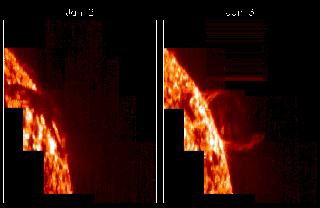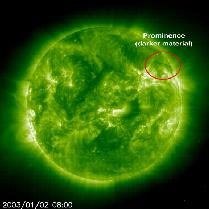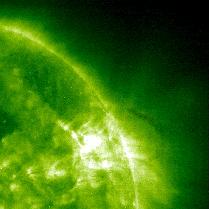|
A prominence that had rotated almost to the edge of our view of the
Sun erupted and is seen lifting off and breaking away from the Sun in
a coronal mass ejection (CME) over an 18-hour period on 3 January
2003. A prominence is like a cloud of particles, usually elongated,
suspended above the surface of the Sun. Erupting prominences are the
source of many CMEs. Similar to a breaking loop observed the week
before, the magnetic field spins, twists, and shakes this structure
before it breaks away. The video of the event was taken in extreme
ultraviolet light at the 195 Angstroms wavelength (green), which is
actually showing ionized iron at 1.5 millions degrees K. An EIT 195Å
still image identifies the prominence the day before it erupted. The
video consists of frames taken every 12 minutes and shown at 6 frames
per second. Note: in the video there is a gap in the data of 2.5
hours near the end of the clip.

Coincidentally, the prominence was observed before and during the
event in a pair of image mosaics from smaller images produced by the
Coronal Diagnostic Spectrometer (CDS), a first for this instrument.
These images shown were formed in the transition region emission line
of O V at 630 Angstroms, which is ionized oxygen at about 250,000
degrees K. The data will be analyzed to extract information about
the temperatures, densities, and velocities of the erupting filament
and the coronal material around it.
Previous Picks of the Week
SOHO began its Weekly Pick some time after
sending a weekly image or video clip to the American Museum of
Natural History (Rose Center) in New York City. There, the SOHO Weekly Pick is displayed with some annotations on a large plasma display.
If your institution would also like to receive the same Weekly Pick from us
for display (usually in Photoshop or QuickTime format), please send
your inquiry to steele.hill@gsfc.nasa.gov.
|



